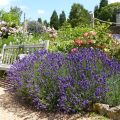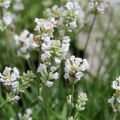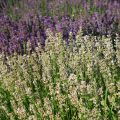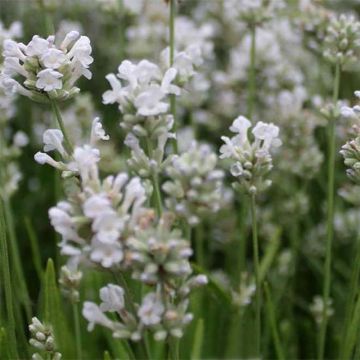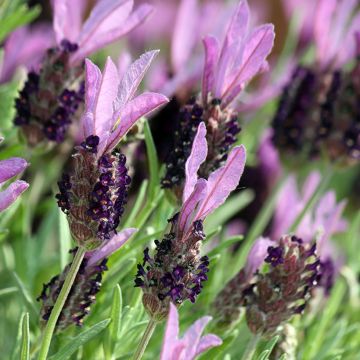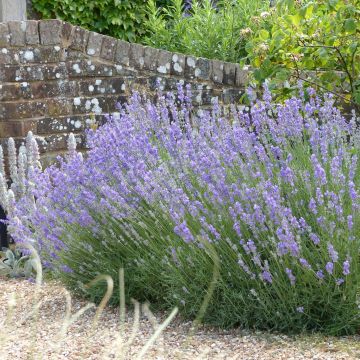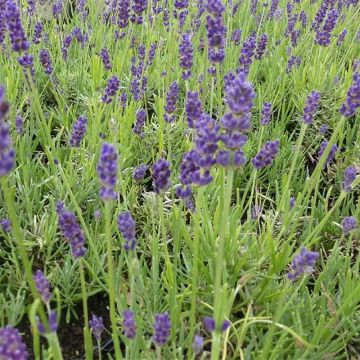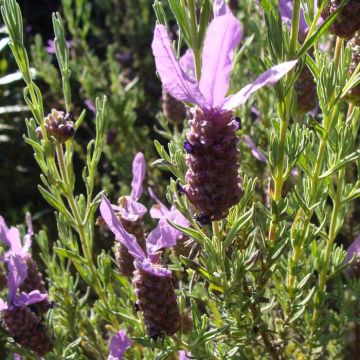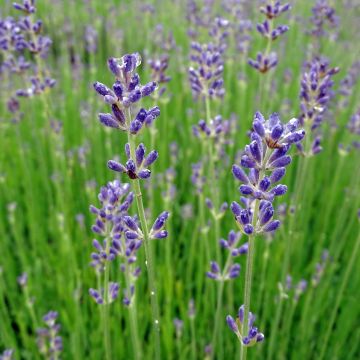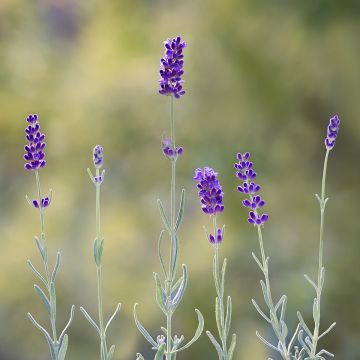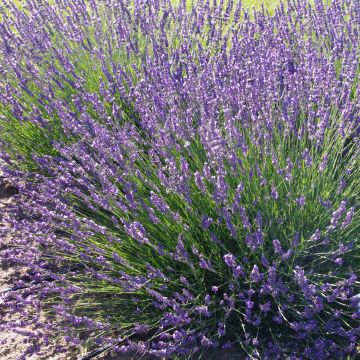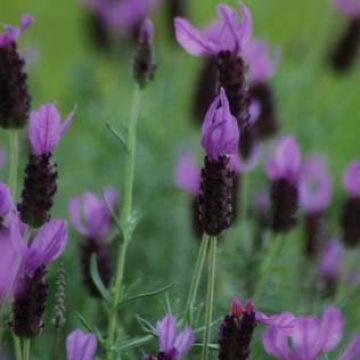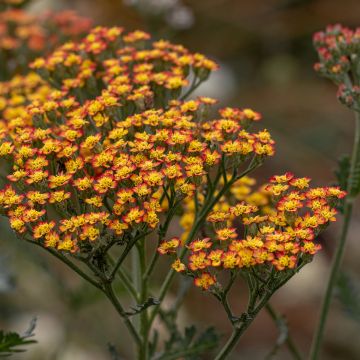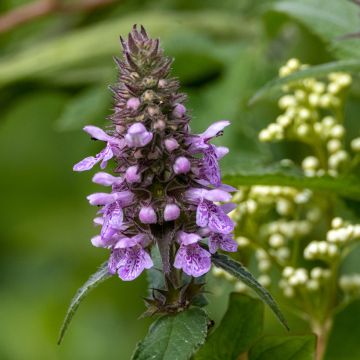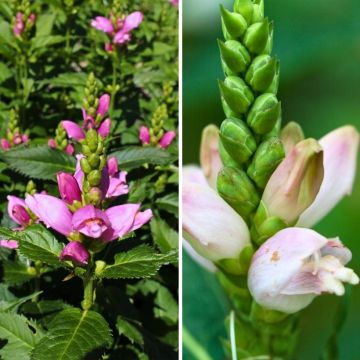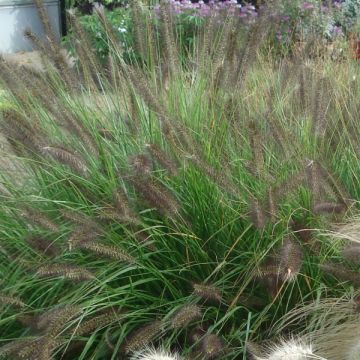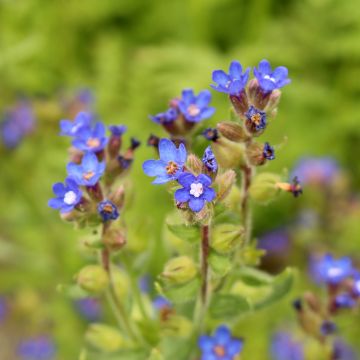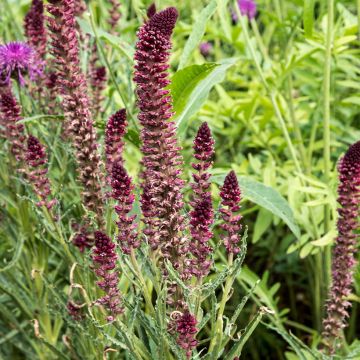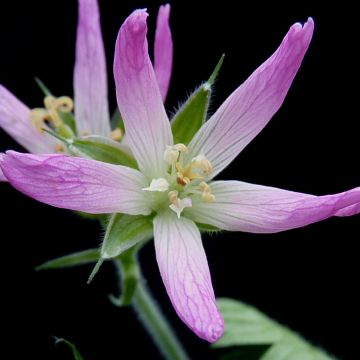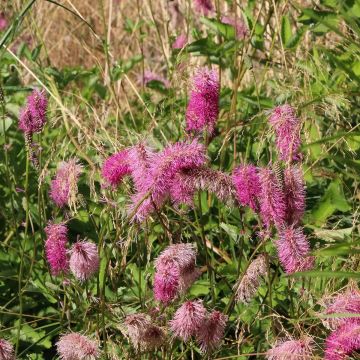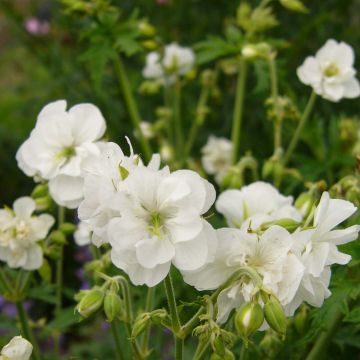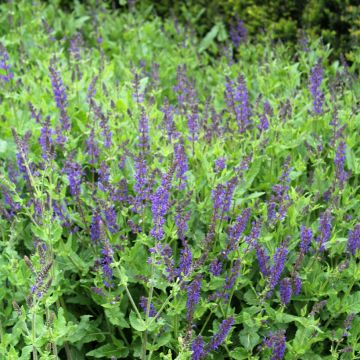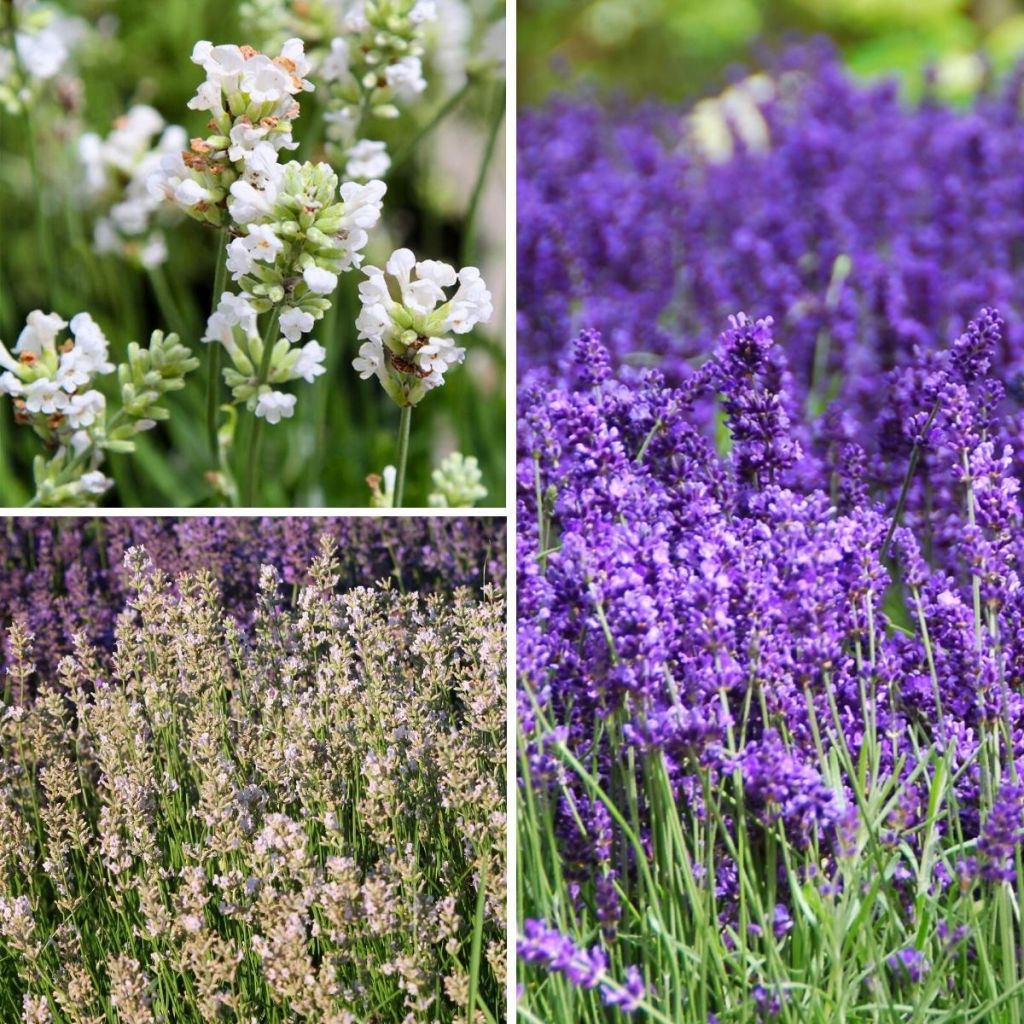

Lavandula angustifolia 'Hidcote', 'Alba', 'Rosea'
Lavandula angustifolia 'Hidcote', 'Alba', 'Rosea'
Lavandula angustifolia Hidcote, Alba, Rosea
English Lavender, Common Lavender, True Lavender
This item cannot be shipped to the selected country
Delivery charge from €5.90
More information
Schedule delivery date,
and select date in basket
This plant carries a 12 months recovery warranty
More information
We guarantee the quality of our plants for a full growing cycle, and will replace at our expense any plant that fails to recover under normal climatic and planting conditions.
From €5.90 for pickup delivery and €6.90 for home delivery
Express home delivery from €8.90.
Does this plant fit my garden?
Set up your Plantfit profile →
Collection items (3 plants)
Description
The collection consists of:
- x 1 Lavandula angustifolia 'Hidcote' : an award-winning variety in England for its ornamental qualities and performance in the garden. Abundant flowering in July-August, with dark purple spikes.
- x 1 Lavandula angustifolia 'Alba': truly bright white flowering from June to August.
- x 1 Lavandula angustifolia 'Rosea': light lilac pink flowering from June to August.
Lavandula angustifolia, sometimes called English lavender, belongs to the family of Lamiaceae. It is a subshrub native to Mediterranean regions that grows in garrigues, in full sun, on rocky, limestone, very dry soils in summer. It forms a dense clump of 60cm (24in) in all directions at flowering time. Its foliage is composed of narrow aromatic leaves of a beautiful gray-silver color in summer, greener in winter.
These lavenders from this collection will therefore be planted in full sun in a very well-drained soil, rather poor, based on gravel or coarse sand. Under these conditions, their vegetation will emit an intense fragrance in summer and they will withstand frost. You can plant them in a raised bed, as a border, in a rockery, container, and even as a low flowering hedge. Allow a spacing of 40cm (16in) between each plant.
With their graphic appearance, the brightness of their foliage, and their beautiful summer flowering, an infinite number of possibilities are available to the gardener. You can associate the lavenders from this collection with ornamental grasses for dry soil which, with their tousled habit, will contrast with the silvery roundness of the lavender. For example, plant them between your bush roses. In a Mediterranean-inspired scene, combine them with small shrubs such as rockroses and shrubby salvias, white, pink, blue, or purple. You can also create beautiful containers to place on the terrace or balcony. It is also possible to combine several varieties of lavenders together, which will create a harmonious and elegant tableau, both in terms of the variety of flower and foliage colours, and the size and volume of the plants.
Report an error about the product description
Flowering
Foliage
Plant habit
Botanical data
Lavandula
angustifolia
Hidcote, Alba, Rosea
Lamiaceae
English Lavender, Common Lavender, True Lavender
Mediterranean
Other Lavendula - Lavender
Planting and care
Lavandula angustifolia should be planted in a warm and sunny location, in a rocky or sandy soil, preferably limestone, very well drained, even dry. Indeed, it does not tolerate clay soils and excess water, both in summer and winter. If this is the case, it will be necessary to lighten the soil by adding sand and gravel. The pruning of Lavandula angustifolia should be done every year, just after flowering, by removing the faded inflorescences. A second pruning will be done in early spring, by cutting back the plant by a third (without going to the old wood), to maintain a beautiful compact, rounded shape and its floriferous qualities.
Since lavender requires very little water, watering will only be necessary in the first year of planting. When pruning after flowering, do not throw away the withered inflorescences, but collect them to make sachets that will delicately perfume the cupboards, and also make excellent moth repellents. For making dried bouquets, it is necessary to harvest the lavender flowers, just fully bloomed, and let them dry in a dry and ventilated place, upside down.
Planting period
Intended location
Care
This item has not been reviewed yet - be the first to leave a review about it.
Summer flowering perennials
Haven't found what you were looking for?
Hardiness is the lowest winter temperature a plant can endure without suffering serious damage or even dying. However, hardiness is affected by location (a sheltered area, such as a patio), protection (winter cover) and soil type (hardiness is improved by well-drained soil).

Photo Sharing Terms & Conditions
In order to encourage gardeners to interact and share their experiences, Promesse de fleurs offers various media enabling content to be uploaded onto its Site - in particular via the ‘Photo sharing’ module.
The User agrees to refrain from:
- Posting any content that is illegal, prejudicial, insulting, racist, inciteful to hatred, revisionist, contrary to public decency, that infringes on privacy or on the privacy rights of third parties, in particular the publicity rights of persons and goods, intellectual property rights, or the right to privacy.
- Submitting content on behalf of a third party;
- Impersonate the identity of a third party and/or publish any personal information about a third party;
In general, the User undertakes to refrain from any unethical behaviour.
All Content (in particular text, comments, files, images, photos, videos, creative works, etc.), which may be subject to property or intellectual property rights, image or other private rights, shall remain the property of the User, subject to the limited rights granted by the terms of the licence granted by Promesse de fleurs as stated below. Users are at liberty to publish or not to publish such Content on the Site, notably via the ‘Photo Sharing’ facility, and accept that this Content shall be made public and freely accessible, notably on the Internet.
Users further acknowledge, undertake to have ,and guarantee that they hold all necessary rights and permissions to publish such material on the Site, in particular with regard to the legislation in force pertaining to any privacy, property, intellectual property, image, or contractual rights, or rights of any other nature. By publishing such Content on the Site, Users acknowledge accepting full liability as publishers of the Content within the meaning of the law, and grant Promesse de fleurs, free of charge, an inclusive, worldwide licence for the said Content for the entire duration of its publication, including all reproduction, representation, up/downloading, displaying, performing, transmission, and storage rights.
Users also grant permission for their name to be linked to the Content and accept that this link may not always be made available.
By engaging in posting material, Users consent to their Content becoming automatically accessible on the Internet, in particular on other sites and/or blogs and/or web pages of the Promesse de fleurs site, including in particular social pages and the Promesse de fleurs catalogue.
Users may secure the removal of entrusted content free of charge by issuing a simple request via our contact form.
The flowering period indicated on our website applies to countries and regions located in USDA zone 8 (France, the United Kingdom, Ireland, the Netherlands, etc.)
It will vary according to where you live:
- In zones 9 to 10 (Italy, Spain, Greece, etc.), flowering will occur about 2 to 4 weeks earlier.
- In zones 6 to 7 (Germany, Poland, Slovenia, and lower mountainous regions), flowering will be delayed by 2 to 3 weeks.
- In zone 5 (Central Europe, Scandinavia), blooming will be delayed by 3 to 5 weeks.
In temperate climates, pruning of spring-flowering shrubs (forsythia, spireas, etc.) should be done just after flowering.
Pruning of summer-flowering shrubs (Indian Lilac, Perovskia, etc.) can be done in winter or spring.
In cold regions as well as with frost-sensitive plants, avoid pruning too early when severe frosts may still occur.
The planting period indicated on our website applies to countries and regions located in USDA zone 8 (France, United Kingdom, Ireland, Netherlands).
It will vary according to where you live:
- In Mediterranean zones (Marseille, Madrid, Milan, etc.), autumn and winter are the best planting periods.
- In continental zones (Strasbourg, Munich, Vienna, etc.), delay planting by 2 to 3 weeks in spring and bring it forward by 2 to 4 weeks in autumn.
- In mountainous regions (the Alps, Pyrenees, Carpathians, etc.), it is best to plant in late spring (May-June) or late summer (August-September).
The harvesting period indicated on our website applies to countries and regions in USDA zone 8 (France, England, Ireland, the Netherlands).
In colder areas (Scandinavia, Poland, Austria...) fruit and vegetable harvests are likely to be delayed by 3-4 weeks.
In warmer areas (Italy, Spain, Greece, etc.), harvesting will probably take place earlier, depending on weather conditions.
The sowing periods indicated on our website apply to countries and regions within USDA Zone 8 (France, UK, Ireland, Netherlands).
In colder areas (Scandinavia, Poland, Austria...), delay any outdoor sowing by 3-4 weeks, or sow under glass.
In warmer climes (Italy, Spain, Greece, etc.), bring outdoor sowing forward by a few weeks.

































